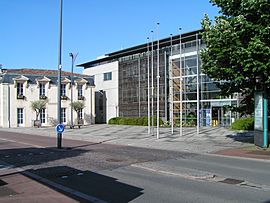Bruges, Gironde facts for kids
Quick facts for kids
Bruges
|
||
|---|---|---|
 |
||
|
||
| Country | France | |
| Region | Nouvelle-Aquitaine | |
| Department | Gironde | |
| Arrondissement | Bordeaux | |
| Canton | Le Bouscat | |
| Intercommunality | Bordeaux | |
| Area
1
|
14.22 km2 (5.49 sq mi) | |
| Population
(Jan. 2019)
|
19,403 | |
| • Density | 1,364.5/km2 (3,534.0/sq mi) | |
| Time zone | UTC+01:00 (CET) | |
| • Summer (DST) | UTC+02:00 (CEST) | |
| INSEE/Postal code |
33075 /33520
|
|
| Elevation | 1–31 m (3.3–101.7 ft) (avg. 10 m or 33 ft) |
|
| 1 French Land Register data, which excludes lakes, ponds, glaciers > 1 km2 (0.386 sq mi or 247 acres) and river estuaries. | ||
Bruges is a lovely commune, which is like a town or local area, located in the southwest of France. It's part of the Gironde department in the region of Aquitaine. This area is known for its beautiful landscapes and rich history.
Contents
What is Bruges Like?
Bruges is a lively place with a good number of people living there. As of January 2019, about 19,403 people called Bruges home. The town covers an area of about 14.22 square kilometers (which is about 5.49 square miles).
Where is Bruges Located?
Bruges is found near the big city of Bordeaux. It's in the Bordeaux arrondissement and the Le Bouscat canton. This means it's part of a larger administrative area. The town is not very high above sea level, with its lowest point being just 1 meter and its highest at 31 meters. The average elevation is around 10 meters.
How is Bruges Governed?
Like all communes in France, Bruges has a local government that helps run the town.
Who is the Mayor?
The mayor is the main leader of the commune. From 2008 to 2014, the mayor of Bruges was Bernard Seurot. The mayor and the local council work together to make decisions for the community, like managing public services and local projects.
What is an Intercommunality?
Bruges is also part of an "intercommunality" called Bordeaux. This means Bruges works with other nearby communes in the Bordeaux area on shared projects. This helps them manage things like public transport, waste collection, and economic development more efficiently.
See also
 In Spanish: Bruges (Gironda) para niños
In Spanish: Bruges (Gironda) para niños
 | Georgia Louise Harris Brown |
 | Julian Abele |
 | Norma Merrick Sklarek |
 | William Sidney Pittman |




